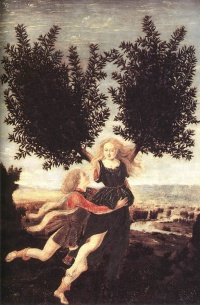Greek mythology
From The Art and Popular Culture Encyclopedia
(Difference between revisions)
| Revision as of 23:46, 23 February 2008 Jahsonic (Talk | contribs) ← Previous diff |
Revision as of 23:52, 23 February 2008 Jahsonic (Talk | contribs) Next diff → |
||
| Line 1: | Line 1: | ||
| [[Image:Danae.jpg|thumb|right|200px|''[[Danaë (Klimt painting)|Danae]]'' ([[1907]]-[[1908|08]]) - [[Gustav Klimt]]]] | [[Image:Danae.jpg|thumb|right|200px|''[[Danaë (Klimt painting)|Danae]]'' ([[1907]]-[[1908|08]]) - [[Gustav Klimt]]]] | ||
| + | [[Image:Apollo and Daphne.jpg|thumb|right|200px|''[[Aopollo]] and [[Daphne]]'']] | ||
| {{Template}}'''Greek mythology''' is the [[corpus|body of stories]] belonging to the [[Ancient Greece|Ancient Greeks]] concerning their [[Polytheism|gods]] and [[hero]]es, the nature of the world and the origins and significance of their own [[Cult (religious practice)|cult]] and [[ritual]] practices. Modern scholars refer to the [[myth]]s and study them in an attempt to throw light on the religious and political institutions of Ancient Greece and on the Ancient Greek civilization, and to gain understanding of the nature of myth-making itself. | {{Template}}'''Greek mythology''' is the [[corpus|body of stories]] belonging to the [[Ancient Greece|Ancient Greeks]] concerning their [[Polytheism|gods]] and [[hero]]es, the nature of the world and the origins and significance of their own [[Cult (religious practice)|cult]] and [[ritual]] practices. Modern scholars refer to the [[myth]]s and study them in an attempt to throw light on the religious and political institutions of Ancient Greece and on the Ancient Greek civilization, and to gain understanding of the nature of myth-making itself. | ||
| The Greek gods, unlike the gods and goddesses of many other cultures and certainly unlike the gods of contemporary monotheistic faiths, are very similar to [[human being]]s. They fight, they lie, they make war, have adulterous relationships and experience the entire gamut of human emotions. The Greek deities were not especially [[moral]] beings - a far cry from the moral perfection ascribed to the Christian god. | The Greek gods, unlike the gods and goddesses of many other cultures and certainly unlike the gods of contemporary monotheistic faiths, are very similar to [[human being]]s. They fight, they lie, they make war, have adulterous relationships and experience the entire gamut of human emotions. The Greek deities were not especially [[moral]] beings - a far cry from the moral perfection ascribed to the Christian god. | ||
| {{GFDL}} | {{GFDL}} | ||
Revision as of 23:52, 23 February 2008
|
Related e |
|
Featured: |
The Greek gods, unlike the gods and goddesses of many other cultures and certainly unlike the gods of contemporary monotheistic faiths, are very similar to human beings. They fight, they lie, they make war, have adulterous relationships and experience the entire gamut of human emotions. The Greek deities were not especially moral beings - a far cry from the moral perfection ascribed to the Christian god.
Unless indicated otherwise, the text in this article is either based on Wikipedia article "Greek mythology" or another language Wikipedia page thereof used under the terms of the GNU Free Documentation License; or on research by Jahsonic and friends. See Art and Popular Culture's copyright notice.


